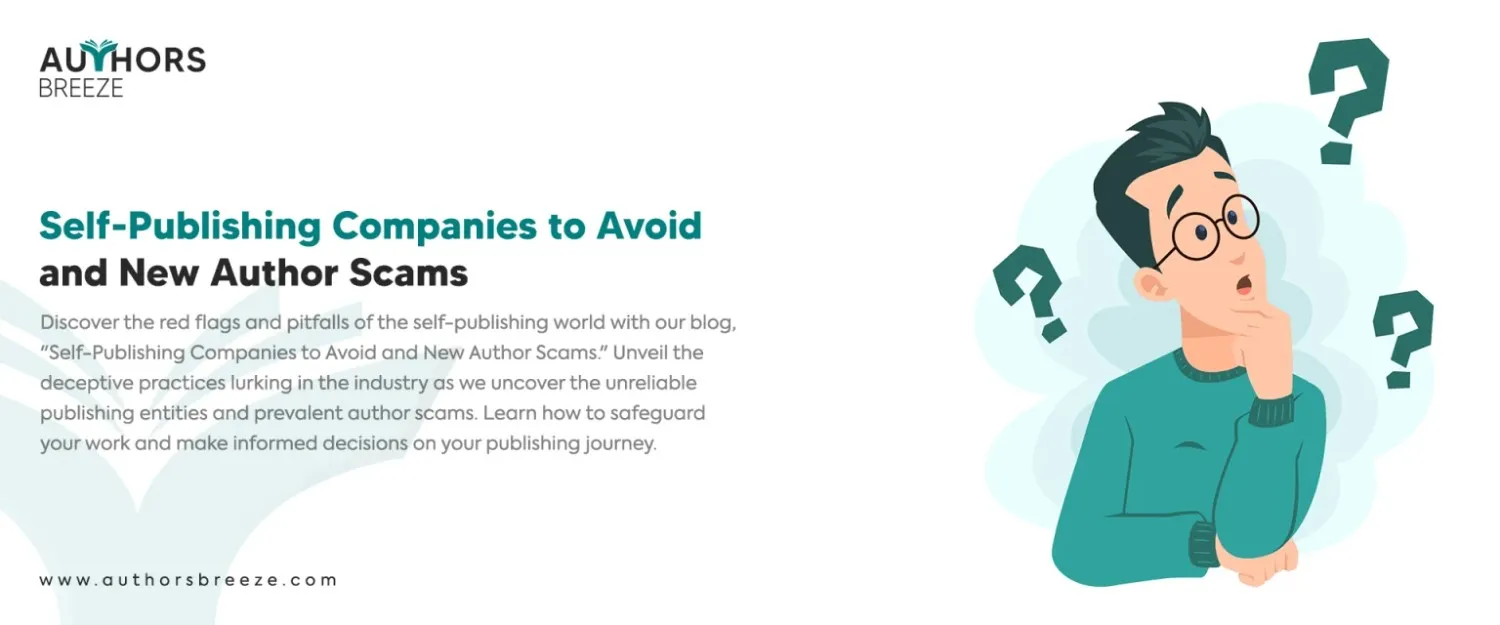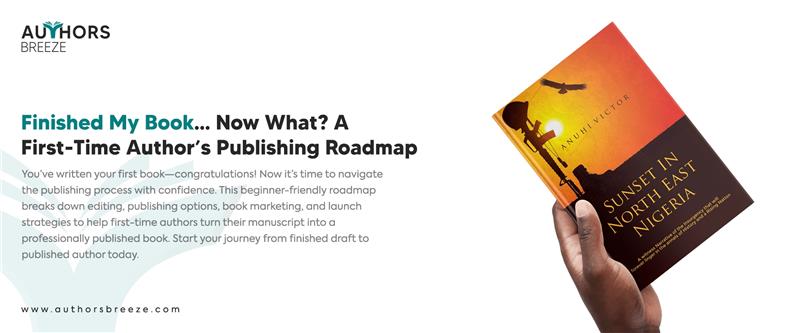Don’t Have Time to Read? Listen to this Article Instead!
Key Takeaways: Self-Publishing Companies to Avoid
- With the rise in scams targeting new authors, it is important to know the self-publishing companies to avoid them.
- Look out for warning signs like lack of transparency in pricing, poor reputation, and promises that seem too good to be true.
- Be aware of common scams targeting new authors, such as vanity publishers, literary agent scams, and fake book reviews.
- Thoroughly research self-publishing companies, understand publishing contracts, and stick to platforms with a proven track record.
- Some reputable self-publishing platforms include Amazon Kindle Direct Publishing, Apple Books, and Authors Breeze.
Start Your Self-Publishing Journey
Take control and publish your book on your terms. We navigate the complexities, so you can focus on your story.
Introduction To Self-Publishing Companies to Avoid
In 2023, 5,3940 reports of fraudulent scams were submitted in the world of magazines and books with 11% (568) of the reports indicating a loss. So, you should know that there are some self-publishing companies to avoid. If you don’t, then no worries, we will tell you about them. Self-publishing is the process of publishing your own books instead of going to traditional publishing companies. It gives authors more control over their work and a chance to share their work directly with their readers. It is a fairly new method, and before this, there were only traditional methods.
As an author, it is better to self-publish your book. It allows you to publish your book without the help of a big publishing company. Sadly, self-publishing can be risky as well. There has been an increase in scams targeting writers who want to write a book. Therefore, you should know what self-publishing companies to avoid in order to protect yourself from these scams.
These scams trick authors and can cause a lot of problems. So, today, we will explore how to know the self-publishing companies to avoid. We will also discuss new author scams and what self-publishing to avoid a safe publishing journey.
Red Flags: Signs of Self-Publishing Companies to Avoid
When you consider self-publishing companies, you should be aware of potential red flags that may indicate that they are untrustworthy or offer low-quality publishing experience. If you find any red flags, you should know that these are one of those self-publishing companies to avoid. Here are some red flags to watch out for:
Lack of Transparency in Pricing
Some publishing companies may not be clear about all the costs involved in the process. So, you need to watch out for hidden fees that can surprise you later. Make sure you understand how much money you will make from your book. Some companies might not explain this clearly.
As a result, this will make it hard for you to know what to expect. Some companies exploit new authors, and this is why you have to identify such self-publishing companies to avoid.
Poor Reputation and Bad Reviews
Before you choose a self-publishing company, take a look at its background. If it has a bad reputation, it is a sign that something might be wrong. So, it is important to read what other authors have to say about their experiences with that particular company.
If many writers have had a bad time with them, it is a warning to stay away. Knowing the background of a company also helps you know what will be thrown at you. This way, you can manage things better.
Promises That Sound Too Good to Be True
No one in the world can promise that your book will sell or be a success. Therefore, if a company claims or guarantees success, you need to be cautious. Success in writing is hard work and a bit of luck. Some companies focus too much on book marketing and less on helping your book succeed.
So, you should be wary of promises that sound a bit too much. This is one of the most prominent signs for self-publishing companies to avoid, so focus on it.
Lack of Editorial Services
Quality editing is essential if you want your book to be professional and well-written. If a self-publishing company does not offer or focus on the value of editing, it may not be the best company to work with. Such companies are not interested in investing in producing high-quality books. Therefore, look for those self-publishing companies to avoid.
Make Your Book Ideal
Eliminate errors, enhance flow, and elevate your writing with expert editors. Polish your book to perfection.
Complicated Rights and Royalty Structures
Review the company contract carefully. Be cautious if the company tries to retain excessive rights or has twisted royalty structures. Make sure that you maintain control over your work and vital decisions; this includes:
- Cover Design
- Pricing
- Distribution
If a company insists on making these decisions without your input, it could be a sign of potential issues. It is of no use to work with a company that does not offer you value. Such companies also fall in the category of self-publishing companies to avoid.
Scams That Target New Authors
There is a long list of self-publishing companies to avoid. Such companies actively do scams and specifically aim for new authors who may have no idea about the publishing industry. Therefore, as an aspiring writer, you need to be aware of these scams to protect yourself. Here are some common scams that target new authors:
Vanity Publishers
Vanity publishers often promise to publish a book by an author for a fee. They make money from the author rather than from book sales. Legitimate publishers typically pay authors by selling the books. They do not take fees from them to sell ebooks of authors. This is one of the most common scams for self-publishing companies to avoid.
Literary Agent Scams
Some fraud agents may request upfront fees or charge reading fees. An authentic literary agent takes a percentage of the earnings from book sales and makes money from it. Therefore, if any publisher of a book or agent asks you for a fee to publish your book, decline this offer immediately. In addition, you can prioritize reputable sources such as the Association of Author Representatives to find agents.
Contest and Award
You need to be careful when writing contests that require an entry fee but offer little in return. Some scams use fake contests to exploit authors. They trap you by saying that this is an ‘entry fee’ for this contest and that you will get gifts if you win it. However, it is most probably a scam. They will take the fee and vanish.
Editing Scams
Scammers may act as editors and charge high fees for their editing services. So, you need to research before taking any services online. You can choose trustworthy editors or editing companies such as Authors Breeze.
Fake Book Reviews
Some services offer to provide positive reviews for a fee. This is not only unethical but can also harm the reputation of an author if discovered. Therefore, always maintain credibility and do not engage in unethical practices.
Copyright and ISBN Charges
Authors should not pay excessive fees for copyright registration or obtaining an ISBN (International Standard Book Number). These services are often available at reasonable costs or even for free. Check first before you are scammed.
Fake Literary Journals and Magazines
Some scammers create fake literary journals or magazines and charge authors for publishing their work. So, you research the credibility of publications before you submit your manuscript. This way, you can save both your time and money.
Phishing Scams
Authors may receive uninvited emails from fake literary agents or publishers. These emails may contain phishing links or request personal information. Therefore, always verify the legitimacy of such communications.
How to Protect Yourself from Scams? Tips for New Authors
If you remain careful, it can help you avoid falling victim to scams and navigate the publishing industry more safely. Also, you should keep informed of self-publishing companies to avoid. To protect yourself from scams, you should:
Thoroughly Research Self-Publishing Companies
You can look for info on websites that keep an eye on the self-publishing industry. These watchdogs often expose scams and give you insights into which companies are trustworthy. In addition, you can ask fellow authors, writing communities, or a writing coach. When you get advice from people who have been through the process, it can be incredibly valuable.
Understand the Publishing Contract
Before you sign any contract, it is wise to consult with a legal expert who understands publishing. They can help you navigate the terms. In addition, they can ensure you don’t get into a deal that could harm you. If the contract is hard to understand or has terms that seem unclear, it’s a red flag. A good contract should be transparent and fair. So don’t hesitate to ask questions or seek clarification.
Utilize Self-Publishing Platforms with a Proven Track Record
Stick to self-publishing platforms that have been around for a while and have a positive reputation. Read reviews from other authors to get a sense of their experiences. Moreover, look for companies that are open about their processes, fees, and royalty structures. Transparency is a good sign. It shows a platform wants to help authors succeed rather than taking advantage of them.
List of Self-Publishing Companies to Avoid
There is a massive list of book publishers you should avoid. The following are vanity publishing companies to look out for:
- Author Solution
- Balboa Press
- Abbott Press
- Barbara Bauer Literary Agency
- Alliant Press
- The Writing Crew
- AlphaScript
- The Clock Writing
- America Star Books
- Olympia Publishers
- Archway Publishing
- Indie Writer Support
What are the Best Book Publishing Companies?
Now that you know the worst self-publishing companies to avoid, we will take a step further. Here are some of the legitimate and best publishing companies.
- Amazon Kindle Direct Publishing
- Apple Books
- Lulu
- BookBaby
- IngramSpark
- Barnes and Noble
- Authors Breeze
While Authors Breeze is not where you publish books, they do help in various aspects of publishing. They help you with many things, such as writing and editing.
Capture the Digital Market
Transform your content or book ideas into engaging and optimized ebooks. Make your literary way to the digital world!
FAQs
What are the pitfalls of self-publishing?
There are mainly 5 common self-publishing mistakes:
- Not researching the self-publishing process
- Editing too quickly
- Creating your own book cover
- Writing a boring blurb
- Not establishing a brand identity
Has anyone been successful in self-publishing?
Yes, Here is an example of Amanda Hocking. She wrote 17 books while working full-time. She published them herself online, selling over a million copies. Ashwin Sanghi, who wrote popular books like The Rozabal Line, also started self-publishing after many publishers turned him down.
What is the best publishing company for first-time authors?
Here are some of the best publishers for first-time authors:
- Black & White Publishing
- Coffee House Press
- Chicago Review Press
- Chronicle Books
- DAW
- Entangled Publishing
Conclusion
In this discussion about self-publishing, we have talked about why many new writers are attracted to it. Unfortunately, we have also talked about how some companies take advantage of these writers through scams. We have pointed out signs of self-publishing companies to avoid and talked about some common ones to watch out for.
Self-publishing can be great, but it is important to be careful and know what to look for. Knowledge is power, and when writers have the right information, they can make smart choices about their books. Work with authentic companies like Authors Breeze that will help you grow as an author.
Find Your Perfect Ghostwriting Match
Turn your vision into a reality with a skilled ghostwriter. Share your ideas, we craft compelling content to bring them to life.






